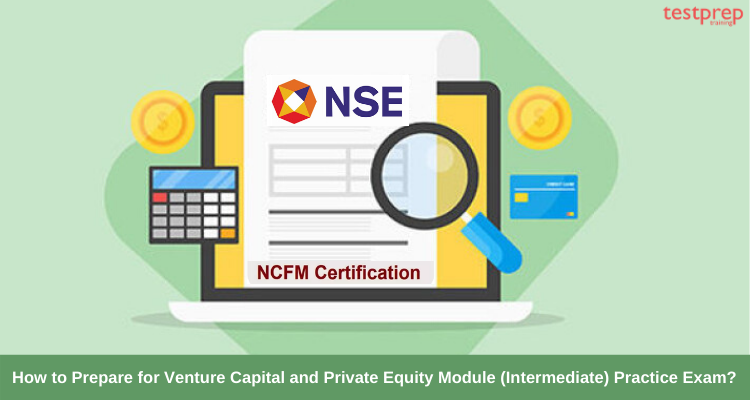NSE Academy Certification in Financial Markets or we can say NCFM, the program is an online testing and certification training program. NCFM examines the practical skills and knowledge required to perform in the financial markets. Subsequently, the NCFM program operates on its intranet and is managed through its assigned test centres located across India. Although, here we are discussing the Venture Capital and Private Equity Module (Intermediate) Practice Exam. If you want to have a career in the stock market or financial exchange, you need to complete the NCFM modules because the NSE requires this for brokerage firms.
Further, NSE NCFM Modules are accommodating for those who want to experience the capital market trading procedures, for those who need to know the settlement, clearing and risk management methods, for those who want to comprehend about the eligibility guidelines for seeking association of NSE, for those who require to learn the other relevant regulatory features of SEBI. Moreover, the growth in the best direction prevails in the hand of possible human resources. The brought-ins, sales, stability and so on. The Financial Markets are centre posts under the economy. In recent years, the significance of small and medium enterprises (SMEs) for economic progress has become especially unique.
However, usually, these firms are higher financially restrained than larger firms. In cases like these, venture funds and private investments become valuable resources for a company’s growth, especially for smaller, more creative businesses. This helps everyone contribute to economic development and innovation in the economy. Consequently, NCFM has created a practice exam for the Venture Capital and Private Equity Module (Intermediate).
Why should one take this course?
The Venture Capital and Private Equity Module (Intermediate) Practice Exam should be considered for:
- Firstly, to understand the purpose of private equity in the country and the contrast between different forms of early-stage finance.
- Secondly, to acknowledge how private equity funds are made and their construction of operation.
- Also, to accommodate the entire extent of post-investment relief that can come along with private equity capital.
Venture Capital and Private Equity Module (Intermediate) Practice Exam: An Overview
To begin with, NCFM is good for people who are new to the stock market and want to see how much they know. Additionally, NCFM offers various modules for beginners, intermediate learners, and advanced users covering different aspects of capital markets. In this article, we’ll focus on the Venture Capital and Private Equity Module (Intermediate) Practice Exam. Private equity is seen as a key part of a strong environment for entrepreneurs.
Learning objectives of the Venture Capital and Private Equity Module (Intermediate) Practice Exam include:
- Firstly, learn about the importance of private equity in the country and how it differs from other ways of getting early-stage money.
- Next, understand how private equity funds work, how they are managed, and how they make money.
- Also, recognize the special aspects of evaluating and overseeing private equity funds.
- Additionally, know what businesses should do to attract private equity investors.
- Moreover, remember how these investors assess companies they want to invest in.
- Furthermore, grasp the entire process, including the thorough checks done before private equity funds are invested in a company.
- After that, understand the role of taxes in private equity deals.
- Additionally, learn about all the help and support that can come with private equity investments.
- Also, understand the rules from SEBI (Alternative Investment Funds) Regulations, 2012 that affect private equity funds.
- Finally, see how Small and Medium Enterprises (SMEs) can benefit from NSE’s platform.
Exam Details
In the Venture Capital and Private Equity Module (Intermediate) Practice Exam, you have 2 hours (120 minutes) to finish it. There are 70 questions, and they’re all multiple choice. To pass, you need to get at least 60% of the answers right. Be careful, though, because if you get a question wrong, you’ll lose some points.
If you pass, your certificate will be valid for 5 years from the day you took the test.
Target Audience
- First of all, students.
- Then, finance Professionals.
- Also, entrepreneurs.
- Furthermore, employees of SMEs.
- In addition, anybody has an interest in this subject.
NCFM Venture Capital And Private Equity Module Course Outline
The course outline includes the domains which the candidate has to cover in order to prepare for the Venture Capital and Private Equity Module (Intermediate) Practice Exam. This is a very important part as it discusses every domain in detail.
So, let’s take a look at the domains and its subtopics.
Private Equity Background
- Firstly, the evolution of Finance for Business
- Secondly, VC Funds and PE Funds
- Then, fund Structure
- Also, leveraging in Funds
- Further, forms of Investment by Funds
- In addition, the J Curve
- Lastly, measuring the Report of Investments and PE Fund
Getting Ready for Growth Capital from Funds
- PE Investment Criteria
- And, the role of Facilitators
- Also, resource Mobilization, Dilution & Valuation
Business Model, Business Plan & Financial Model
- Business Model
- Financial Model
- Business Plan
Buyouts and other Transactions
- LBO
- As well as, MBO
- Moreover, project-based Funding Transactions
- Of course, distressed Assets Funding Transactions
PE Investment Process
- Sourcing of Proposals
- Also, initial contact / Flier
- Then, the Non-Disclosure Agreement (NDA)
- Likewise, information Memorandum
- Further, management Presentation
- Moreover, initial Due Diligence
- Similarly, preliminary Investment Note
- In addition, the non-binding Letter of Intent
- Like, final Due Diligence
- Together with, final Investment Memorandum
- Or, signing the Term Sheet
- Lastly, closure of the Deal
Documentation and Typical Investment Conditions
- Typical Investment Conditions
- Subscription Agreement
- And, shareholders’ Agreement
- Tax Aspects of PE Investment
- Section 10(23FB) of Income Tax Act, 1961
- Also, section 10(47) of the Income Tax Act, 1961
- Income Types
- Securities Transaction Tax (STT)
- Further, tax on Distributed Profit (Dividend Distribution Tax)
- Moreover, taxability of Interest
- Likewise, taxability of Short Term Capital Gains on Debt
- Then, taxability of Long Term Capital Gains on Debt
- Not to mention, taxability of Short Term Capital Gains on Equity
- In addition, taxability of Long Term Capital Gains on Equity
- Of course, taxation of Non-Residents
Post-Investment Support, Monitoring and Exit
- Support
- Monitoring
- Exit
EMERGE: NSE’s Platform for SMEs
- Emerge Introduction
- Benefits of Listing for Companies
- Also, the benefits of Listing for Investors
- Eligibility Criteria
- Listing Requirements
- And, listing Fees
- Selecting a Merchant Banker for the Issue
- Role of Merchant Bankers in Emerge
- Further, the role of Market Makers in Emerge
- The Emerge Trading Platform
Preparatory Guide: Venture Capital and Private Equity Module
Now, let’s talk about how to get ready for the Venture Capital and Private Equity Module (Intermediate) Practice Exam. Figuring out the right steps can be tough, but you have to give it your all to pass the test. Luckily, NCFM offers training programs that cover both theory and practice to help you prepare for their exams.

Look up the Objectives
The objectives or we can say domains, are the most important element in the preparation guide for any exam be it Venture Capital and Private Equity Module (Intermediate) Practice Exam.
So, the Venture Capital and Private Equity Module (Intermediate) Practice Exam includes the following objectives:
- Firstly, private Equity Background
- Secondly, getting Ready for Growth Capital from Funds
- Then, business Model, Business Plan & Financial Model
- Also, buyouts and other Transactions
- And, PE Investment Process
- Further, documentation and Typical Investment Conditions
- Moreover, tax Aspects of PE Investment
- In addition, post-Investment Support, Monitoring and Exit
- Lastly, EMERGE: NSE’s Platform for SMEs
Refer to the Study Guide
The study guide or blueprint is the second necessary element as it ensures the candidate about the objectives or domains about the Venture Capital and Private Equity Module (Intermediate) Practice Exam.
Likewise, the study guide includes the objectives and its sun-topics. The candidate can find the blueprint on the official site of the NSE, and also, can download it from there.
Study Material
The NCFM exams are pretty conceptual and straightforward.
Although there are several reference books accessible on the internet, the candidate can go for any other book they want, a question bank, or any other test series to clear the Venture Capital and Private Equity Module (Intermediate) Practice Exam.
But, the candidate should focus on the book provided by the NSE.
Take Practise Tests
NCFM Venture Capital And Private Equity Module Practice Tests are also a very important step in the preparation for Exam. Also, there are several free NCFM Venture Capital And Private Equity Module Mock Test available on the Internet nowadays, the candidate can choose whichever they want.
Further, we suggest the candidate take as many practise test as they can.
Some Tips!
Nonetheless, here are a few tips to prepare for NCFM Venture Capital and Private Equity Module (Intermediate) Practice Exam:
- First of all, give at least two weeks for preparation.
- Then, practice the workbook at least twice before attempting the exam.
- Further, mind the negative marking on the questions.
- Last but not the least, take as many practise tests as you can.
Final Thoughts
Private equity is regarded to be one of the elements of a good entrepreneurial ecosystem. In the last couple of decades, it has been observed as a serious source of finance for start-ups, growing companies and takeover transactions. This module focuses on private equity. The candidate can rely on this preparatory guide and start practising. Moreover, students are advised to further read the module on ‘Project Finance’ for a complementary perspective of the role of debt in financing projects. So, start practising today. CLICK HERE FOR MORE PRACTISE TESTS!

Enrich your profile with advanced learning skills and expert tutorials on Venture Capital and Private Equity Module (Intermediate) Practice Exam. Prepare and become Certified Finance Professional Now! PASS with a 100% guarantee!

